Mitchell Hadley's Blog: It's About TV!, page 78
March 9, 2022
Stranger in a strange land

 This is a piece I first wrote about five years ago, and I think it's as relevant today as it was back then—maybe even more so, I don't know. It captures a certain feeling, a mood that's symbolic of this age we've entered. Not the Twilight Zone, but another kind of twilight—the twilight of an era, maybe the twilight of everything. Again, I don't know. Even with the respite we've gotten after moving out of Minnesota, I still can't shake the feeling that life today is like being surrounded by the enemy.
This is a piece I first wrote about five years ago, and I think it's as relevant today as it was back then—maybe even more so, I don't know. It captures a certain feeling, a mood that's symbolic of this age we've entered. Not the Twilight Zone, but another kind of twilight—the twilight of an era, maybe the twilight of everything. Again, I don't know. Even with the respite we've gotten after moving out of Minnesota, I still can't shake the feeling that life today is like being surrounded by the enemy. l l l
Stranger in a Strange Land? Or is it The Man Who Fell to Earth? Either science fiction analogy is OK, I guess, because the world we live in today is more like science fiction than anything else. The question is what people from the ‘50s and ‘60s would think of television today, if they hadn’t been exposed to the cultural evolution that some of us have gone through. You find this in reverse many times when trying to explain the appeal of classic television to those who are either too young to remember it, or too lacking in an appreciation of history to care about it. I’ve been told of many young people (and some not so young) who won’t even consider watching a black-and-white TV show or movie, which I think is ridiculous since all you’re really doing is arbitrarily depriving yourself of something you might otherwise enjoy based solely on your lack of imagination in being unable to appreciate anything that doesn’t spell it out for you right there.*
*On the other hand, I saw an article today that says today's kids, weaned on Netflix and the like, don't know what commercials are. On balance, that's probably a good thing, although try explaining those DVD sets of classic commercials to them.
I was prompted to this thought by reading a discussion at Home Theater Forum , one that unfortunately got a bit testy toward the end, as such discussions tend to do. The topic had morphed into comparing classic television with current television, whether or not wholesomeness was an adequate substitute for gritty realism, how one defined “realism,” what the purpose of television was in the first place, and other existential questions. Experience has taught me not to get in the middle of these kinds of discussions – well, that, and the fact that I’ve got my own blog where I get to control the conversation myself.
 Anyway, people who have no particular appreciation of cultural history often find it impossible to understand what things were like in the ‘50s and ‘60s (or even the ‘70s and ‘80s, if we’re being honest), prompting them to declare anything from that time period “unrealistic” because it doesn’t match up to their contemporary expectations. (People like me who express pleasure in classic television are often accused of "living in the past," or "denying progress.") Given a nuclear family, children who aren’t juvenile delinquents, couples who don’t sleep together prior to marriage, women who don’t work outside the house, and any number of by-products of another era (comments that appear to be sexist, racist, or otherwise offensive), and for these people it simply doesn’t compute; hence, it has to be something totally idealized, which is another way of dismissing “things that never were the way they’ve been portrayed.”
Anyway, people who have no particular appreciation of cultural history often find it impossible to understand what things were like in the ‘50s and ‘60s (or even the ‘70s and ‘80s, if we’re being honest), prompting them to declare anything from that time period “unrealistic” because it doesn’t match up to their contemporary expectations. (People like me who express pleasure in classic television are often accused of "living in the past," or "denying progress.") Given a nuclear family, children who aren’t juvenile delinquents, couples who don’t sleep together prior to marriage, women who don’t work outside the house, and any number of by-products of another era (comments that appear to be sexist, racist, or otherwise offensive), and for these people it simply doesn’t compute; hence, it has to be something totally idealized, which is another way of dismissing “things that never were the way they’ve been portrayed.”This is a subtle point, which is why it’s not a good idea to dismiss it with such a simplified, off-hand solution. It is true that most portrayals of a given period in time are, to some extent, idealized. Even documentarians do this in order to substantiate a narrative they’re trying to present. We shouldn’t expect total realism from anything; even a photograph or a home movie can’t capture everything that went into creating a particular moment. Given that total realism is, therefore, impossible, the best you can do is present something that is recognizable to viewers – or maybe I should say plausible. It’s true that series like Leave it to Beaver probably fell on the “idealized” side of the line, but not to the extent that the people who watched it couldn’t understand what it represented.
 The complaint many people have about contemporary television is that, as one HTF commentor put it, "the characters [on classic TV shows] seem to be relatable human beings. I stopped watching present-day 'entertainment' years ago, but when I see segments of it I feel as if I must live in a different Universe." The stranger in a strange land, indeed. Flip to any given series, and you'll find a world in which your next door neighbor might be a meth dealer, the couple down the street might be a threesome, or undercover Communist agents (or both), everyone’s a quirkbot and every single life seems to have been ripped from the pages of a soap opera script, religion is barely mentioned (and when it is, it's usually disparaged) and the default setting is not good humor and hopefulness, but cynicism and world-weariness. It's as if, when we decided to get rid of Frank Capra and his "Capra-corn," we replaced him with Albert Camus. There’s a certain sort of realism here as well, in that these things do happen, but I’m willing to bet that if you dropped most people into the middle of a neighborhood like this, they wouldn’t recognize it.
The complaint many people have about contemporary television is that, as one HTF commentor put it, "the characters [on classic TV shows] seem to be relatable human beings. I stopped watching present-day 'entertainment' years ago, but when I see segments of it I feel as if I must live in a different Universe." The stranger in a strange land, indeed. Flip to any given series, and you'll find a world in which your next door neighbor might be a meth dealer, the couple down the street might be a threesome, or undercover Communist agents (or both), everyone’s a quirkbot and every single life seems to have been ripped from the pages of a soap opera script, religion is barely mentioned (and when it is, it's usually disparaged) and the default setting is not good humor and hopefulness, but cynicism and world-weariness. It's as if, when we decided to get rid of Frank Capra and his "Capra-corn," we replaced him with Albert Camus. There’s a certain sort of realism here as well, in that these things do happen, but I’m willing to bet that if you dropped most people into the middle of a neighborhood like this, they wouldn’t recognize it.Contrast that with the average viewer's reaction to a series from the classic era. Whether or not your family was like the Cleavers, for example, they weren’t far off from what how many families lived. Their values were similar, their families seemed a lot like the ones you knew in the neighborhood. Except, maybe, for the couple who lived down the block, the one where he’s always getting drunk and shouting about something, and she goes running from the house, crying, only to come back in a day or two. They didn’t show people like them, at least not on sitcoms, but then that was the point, wasn’t it? They weren’t funny, and they weren’t entertaining, and that wasn’t what Leave it to Beaver was all about. My point is that nobody living in the same time period as the Cleavers would have looked at them as if they were out of place, people from another neighborhood, anything like that. They were like you and me, if perhaps a little more perfect than we were. And, lest you forget what you were watching, the commercials would remind you that this was a television show you were watching, not real life.
 Back then, married couples on television didn't even sleep in the same bed together. Now, you've got plenty of couples knoodling between the sheets - and not all of them are married, nor are all of them even members of the opposite sex. The cops aren't always the good guys, and many cable series (cable? What's that?) center around something called an "anti-hero." And try explaining to someone who watched I Led Three Lives and The FBI how you could create a series around a couple of Soviet spies, let alone calling that series The Americans. If many of those earlier shows were like a steady diet of sugary cereal, today's series often require a prescription for Prozac.
Back then, married couples on television didn't even sleep in the same bed together. Now, you've got plenty of couples knoodling between the sheets - and not all of them are married, nor are all of them even members of the opposite sex. The cops aren't always the good guys, and many cable series (cable? What's that?) center around something called an "anti-hero." And try explaining to someone who watched I Led Three Lives and The FBI how you could create a series around a couple of Soviet spies, let alone calling that series The Americans. If many of those earlier shows were like a steady diet of sugary cereal, today's series often require a prescription for Prozac.In a way this is so similar to how the elitists of Establishment America have, for so long, misunderstood the rest of the country, its values and its way of life. As the last presidential election demonstrated, there’s a wide gap out there between the world of the elitists and the world of everyone else, and considering how most people in the entertainment industry come from that world of elitists, I don’t suppose we should be surprised. After all, everyone writes about what they know about.
This segues us, ever so gently, into the eternal question of television’s version of the chicken and the egg. Does television determine cultural mores, or does it simply reflect them? My own opinion, for what it’s worth, has always been that television is a follower, not a leader – BUT it’s also a persuader, a facilitator, an enabler, a whisperer. Immerse yourself in the world of television, and then try to resist the temptations that these shows offer, the way they gradually – over a period of months or years – lure you into their way of thinking. Many people advocate a withdrawal from popular and social media - including television and movies - in order to recapture and reinvest in their faith. Others insist that Christians must engage with popular media and the arts if they hope to change the culture. I don't know who's right; either way, it speaks to the power of television to shape minds and attitudes.
I could go on, and someday will, because I'm as guilty of simplification as anyone. The point, however, remains the same. While there are some outstanding programs on television today, many of them relate to a recognizable world, one not so different from our own. There is something fundamentally different about classic television, about how it develops organically from the culture which it reflects. That's something I can't say about most of today's programs. They present a world that, for the most part, is far different from the one which I inhabit - darker, cruder, rougher, more nihilistic. It's not the world I want to live in. To paraphrase Dominick Dunne's wonderful book about the O.J. Simpson trial , it's another country, not my own. Perhaps that's the best analogy of them all. TV
Published on March 09, 2022 05:00
March 7, 2022
What's on TV? Saturday, March 7, 1959

 After looking at the Tuesday listings for three consecutive weeks (albeit from three different years), I think it's time to look elsewhere, don't you? So let's take a look at the Saturday listings in this Dallas-Fort Worth issue—we haven't done that in awhile. Speaking of which, a few weeks ago Top Cat James mentioned the cover of the
February 11, 1967
issue, which bore the headline, "TV on Saturday Mornings: When People Are Second-Best." Well, this is an example of what the article was talking about. In contrast to the late 1960s, when cartoons dominated the Saturday morning scene, TV in 1959 featured mostly live-action adventure shows and Western movies: Robin Hood, Sky King, Circus Boy, Detective's Diary. Sure, there were animated shows, but nothing like it would be. We're back to that now, only much of it is local news, infomercials, and packaged E/I shows. I guess now it's viewers who are second-best.
After looking at the Tuesday listings for three consecutive weeks (albeit from three different years), I think it's time to look elsewhere, don't you? So let's take a look at the Saturday listings in this Dallas-Fort Worth issue—we haven't done that in awhile. Speaking of which, a few weeks ago Top Cat James mentioned the cover of the
February 11, 1967
issue, which bore the headline, "TV on Saturday Mornings: When People Are Second-Best." Well, this is an example of what the article was talking about. In contrast to the late 1960s, when cartoons dominated the Saturday morning scene, TV in 1959 featured mostly live-action adventure shows and Western movies: Robin Hood, Sky King, Circus Boy, Detective's Diary. Sure, there were animated shows, but nothing like it would be. We're back to that now, only much of it is local news, infomercials, and packaged E/I shows. I guess now it's viewers who are second-best. -4- KRLD (CBS) MORNING 8:00 CARTOONS—Kids 8:30 CAPT. KANGAROO—Kids 9:30 MIGHTY MOUSE—Cartoons 10:00 HECKLE AND JECKLE 10:30 ROBIN HOOD—Adventure 11:00 SKY KING—Adventure 11:30 MOVIE—Western “Firebrands of Arizona” (1944) AFTERNOON 12:30 CARTOONS—Kids 12:45 NEWS 1:00 SPORTS—Mercer, Harrison 1:30 ICE HOCKEY—Rangers vs. Black Hawks 3:45 NEWS—Bob Brock 4:00 TRAVELOG COLOR 4:30 LONE RANGER—Western 5:00 JOHNNY HICKS—Variety 5:30 COMMAND PERFORMANCE EVENING 6:00 NEWS—Reid Collins 6:15 POLICE REPORT—Dallas 6:20 WEATHER—Jack Harrison 6:30 PERRY MASON—Mystery 7:30 WANTED—DEAD OR LIVE 8:00 GALE STORM—Comedy 8:30 HAVE GUN—WILL TRAVEL 9:00 GUNSMOKE—Western 9:30 DEATH VALLEY DAYS—Drama 10:00 NEWS 10:20 PEOPLE AND PLACES—Hogan 10:30 GOURMET—David Wade 11:00 MOVIE—Mystery “Murder in Greenwich Village” (1937)
-5- WBAP (NBC) MORNING 8:00 HAND ARTS—Education 8:30 TEXAS CURRICULUM 9:00 HOWDY DOODY—Kids 9:30 RUFF AND REDDY 10:00 FURY—Adventure 10:30 CIRCUS BOY—Adventure 11:00 TRUE STORY—Drama 11:30 DETECTIVE’S DIARY AFTERNOON 12:00 TOWN AND COUNTRY—Pigg 12:15 TELEVIEWS—Panel 12:30 CHRISTIAN QUEJSTIONS 1:00 PLEASURE ISLAND—Johnny Hay 2:00 COLLEGE BASKETBALL—Cincinnati vs. Bradley Cincinnati at Bradley 4:00 WOMEN’S BOWLING 4:30 STEVE DONOVAN—Western 5:00 MOVIE—Western “Montana Belle” (1952) EVENING 6:30 PEOPLE ARE FUNNY 7:00 PERRY COMO—Variety COLOR Guests: Ronnie Burns, Eve Arden, Max Bygraves 8:00 BLACK SADDLE—Western 8:30 CIMARRON CITY—Western 9:30 D.A.’s MAN—Drama 10:00 NEWS 10:30 MOVIE—Comedy “You Can’t Take It with You” (1938)
-6- KCEN (TEMPLE) (NBC) MORNING 9:00 HOWDY DOODY—Kids 9:30 RUFF AND REDDY 10:00 FURY—Adventure 10:30 CIRCUS BOY—Adventure 11:00 FUN AND NON-SUCH—Kids 11:30 DETECTIVE’S DIARY AFTERNOON 12:00 MR. WIZARD—Education 12:30 LEARN AND LIVE—Education 1:00 CHAMPIONSHIP BOWLING 2:00 COLLEGE BASKETBALL—Cincinnati vs. Bradley Cincinnati at Bradley 3:30 CROWDED OUT—Documentary SPECIAL 4:00 WOMEN’S BOWLING 4:30 TEN FOR SURVIVAL—Huntley 5:00 COMMAND PERFORMANCE 5:30 SPORTS—Dub King EVENING 6:00 HAWKEYE—Adventure 6:30 PEOPLE ARE FUNNY 7:00 PERRY COMO—Variety COLOR Guests: Ronnie Burns, Eve Arden, Max Bygraves 8:00 BLACK SADDLE—Western 8:30 CIMARRON CITY—Western 10:00 NEWS 10:25 SPORTS 10:30 MOVIE—Spy Drama “The Iron Curtain” (1948)
-8- WFAA (ABC) MORNING 7:30 AGRICULTURE ON PARADE 7:45 THROUGH THE PORTHOLE 8:00 MOVIE—Western “Frontier Investigator” (1949) 9:00 MOVE—Documentary “On the Barrier Reef” 10:30 FARMER AL FALFA—Cartoons 11:00 UNCLE AL—Kids AFTERNOON 12:00 QUIZ ‘EM ON THE AIR 12:30 I LED THREE LIVES—Cartoons 1:00 CHARLIE CHAN—Mystery 1:30 MR. DISTRICT ATTORNEY 2:00 COLLEGE BASKETBALL—Missouri vs. Kansas State Missouri at Kansas State 3:45 SPORTS—Hayes, Wise 4:00 DALLAS BANDSTAND—Music 5:00 ALL-STAR GOLF—Sarasota, Fla. Sam Snead vs. Billy Maxwell EVENING 6:00 DANGER IS MY BUSINESS 6:30 DICK CLARK—Music Guests: Jaye P. Morgan, Paul Anka, Dale Hawkins, Fabian and the Coasters 7:00 JUBILEE U.S.A.—Red Foley Guests: Tex Ritter, the Schmitz Sisters 8:00 DANCING PARTY—Welk 9:00 CITIZEN SOLDIER—Drama 9:30 SA 7—Drama 10:00 NEWS 10:15 SPORTS—Wes Wise 10:30 MOVIE—Double Feature 1. “Gun in His Hand” Dallas TV Debut 2. Accused of Murder” (1956) Dallas TV Debut
10 KWTX (WACO) (CBS, ABC) MORNING 8:30 TEXAS CURRICULUM 9:00 CAPT. KANGAROO—Kids 9:30 MIGHTY MOUSE—Cartoons 10:00 HECKLE AND JECKLE 10:30 ROBIN HOOD—Adventure 11:00 UNCLE AL—Kids 11:30 LET’S EXPLORE—Education AFTERNOON 12:00 MOVIE—Western 1:00 LIFE WITH ELIZABETH—Comedy 1:30 CONRAD NAGEL—Drama 2:00 COLLEGE BASKETBALL—Missouri vs. Kansas State Missouri at Kansas State 4:00 FLASH GORDON—Space 4:30 LONE RANGER—Western 5:00 JOE PALOOKA—Drama 5:30 REPORT TO THE PEOPLE 5:45 AIR FORCE STORY EVENING 6:00 LEAVE IT TO BEAVER—Comedy 6:30 PERRY MASON—Mystery 7:30 WANTED—DEAD OR LIVE 8:00 DANCING PARTY—Welk 9:00 GUNSMOKE—Western 9:30 HAVE GUN—WILL TRAVEL 10:00 NEWS 10:25 SPORTS 10:30 MOVIE—Adventure “The Golden Mask” (English; 1954)
11 KFJZ (Ind.) AFTERNOON 12:00 MOVIE—Western “Rainbow over Texas” 1:00 MOVIE—Drama “Green Grass of Wyoming” (1949) 2:30 ABBOTT AND COSTELLO 3:00 I MARRIED JOAN—Comedy 3:30 MOVIE—Drama “Blackmail” (1939) 5:00 ADVENTURE THEATER EVENING 6:00 POPEYE—Cartoons 6:15 MOVIE—Melodrama “The Mummy’s Tomb” (1942) 7:30 MOVIE—Drama “Rebecca” (1940) 10:00 MOVIE—War Drama “Objective, Burma” (1945) 11:30 MOVIE—Drama “6000 Enemies” (1939)
TV
Published on March 07, 2022 05:00
March 5, 2022
This week in TV Guide: March 7, 1959

 Walter Brennan—veteran of nearly 40 years in the movies, three-time Oscar winner, and currently the star of ABC's The Real McCoys—has some interesting thoughts on television: "It's like ice cream. Awfully good stuff but you've got to be careful not to 'eat' too much of it."
Walter Brennan—veteran of nearly 40 years in the movies, three-time Oscar winner, and currently the star of ABC's The Real McCoys—has some interesting thoughts on television: "It's like ice cream. Awfully good stuff but you've got to be careful not to 'eat' too much of it."In truth, he wonders why anyone would willingly choose to do a television series, given the workload. "We have to cover 14 script pages a day and do 39 shows a year. I wake up in the middle of the night wondering why a man in his right mind does it. Why, I see more of the people I work with in The Real McCoys than I do my own wife."
On the other hand, he also understands that television is the future, and that anyone who wants to continue working is going to have to gravitate towards it. "TV is the thing that is modern, and you've got to go along with it. They sorta talked me into this series against my better judgment. Now that I'm in—well, I think we've got a good show. Anyway, people seem to like it. And I like the people on the show. And I'm rather taken with [his character] Grampa McCoy."
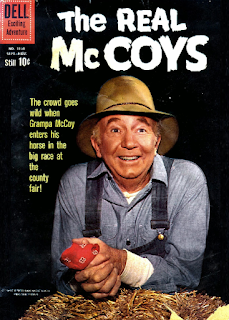 I suppose it's likely more people saw Walter Brennan during the six seasons (plus endless reruns, not to mention DVD and streaming) of The Real McCoys than all of his movies put together. It's true that his three Best Supporting Actor Oscars came from a different time in the movies, when the role of the supporting actor was well and exclusively defined. (One wouldn't see Meryl Streep, for example, slumming in a Supporting Actress role.) And television has been very good to Brennan, giving him an income that, with his careful management, has allowed him to become a wealthy man. With that kind of security comes the freedom to be outspoken, and Brennan has some definite thoughts on TV. He's fond of it and watches it "a good deal" until something on it starts to annoy him. He's a big fan of his own show (never misses it), and prefers programs like Gunsmoke, Lawrence Welk, George Burns and Red Skelton to the "prestige" dramas such as Playhouse 90.
I suppose it's likely more people saw Walter Brennan during the six seasons (plus endless reruns, not to mention DVD and streaming) of The Real McCoys than all of his movies put together. It's true that his three Best Supporting Actor Oscars came from a different time in the movies, when the role of the supporting actor was well and exclusively defined. (One wouldn't see Meryl Streep, for example, slumming in a Supporting Actress role.) And television has been very good to Brennan, giving him an income that, with his careful management, has allowed him to become a wealthy man. With that kind of security comes the freedom to be outspoken, and Brennan has some definite thoughts on TV. He's fond of it and watches it "a good deal" until something on it starts to annoy him. He's a big fan of his own show (never misses it), and prefers programs like Gunsmoke, Lawrence Welk, George Burns and Red Skelton to the "prestige" dramas such as Playhouse 90.On the other hand. . . "I don't watch to criticize, but of course you can't help it. I even criticize myself. I don't like all this violence on TV these days. I don't like depressing things. I have an instinct to watch the other guy. . . If a guy thinks at all, he knows he's fortunate to have had a little recognition. He'd be silly to think it was all him." He recalls a conversation he had with a successful film director, to whom he said, "'God has been very kind to you.' He said, 'What do you mean! I did it all myself.' I said—well, you can't print what I said."
Brennan and Dezi Arnez once figured that The Real McCoys would be good for about five seasons before hitting the wall, and that's just fine with him. "To be in this business longer than that a man really has to have a hole in his head." It's not his last go-round in the weekly series department, though, with upcoming stops such as the underrated The Guns of Will Sonnett (a curious late-60s Western that debuted long after the golden age of Westerns had ended) and To Rome With Love. For anyone familiar with Brennan's Western persona, a must-see is his lampooning of that character in the wonderful James Garner comedy Support Your Local Sheriff!
l l l
Here's a headline you don't see often: "How Television Encourages Children to Read." This is so contrary to the conventional thinking, both then and now, that it deserves a closer look.
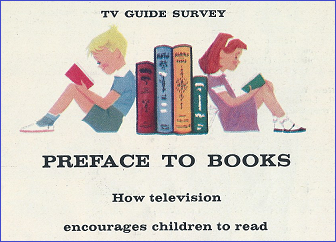 The idea is that television shows send children running to the library to learn more about what they've seen, whether it be stars like Wyatt Earp, Robin Hood and Davy Crockett, or books on "how to make a monster."
The idea is that television shows send children running to the library to learn more about what they've seen, whether it be stars like Wyatt Earp, Robin Hood and Davy Crockett, or books on "how to make a monster."The bulk of the article details the ways in which libraries are learning how to use the new medium to their own advantage. In Philadelphia, for instance, librarians publicize upcoming shows such as Peter Pan or Sleeping Beauty and suggest to kids that they'll want to read the book before they see the program. In Los Angeles, where their evidence suggests "television programs stimulate children to read more widely," Davy Crockett is such a big hit that one patron contributed enough funds for the library to purchase 50 copies of Crockett biographies. Denver reports that Shirley Temple's Storybook has sparked new interest in fairy tales, and in New York, Golden Press is working on book adaptations of popular TV shows such as Maverick and Leave It to Beaver. The head children's librarian in San Francisco goes so far as to say that TV stimulates children to find out more factual information about the characters in their favorite shows.
All is not completely rosy, however; in Chicago, one librarian says she could not convince a child that Cinderella was written by Charles Perrault—the child was sure it was Rogers and Hammerstein.* Children do tend to be confused when shows are widely different than the books on which they're based (but then, aren't we all?), and kids from "poorer" reading groups often want simplified versions of the stories they see, rather than the real thing.
*Kids nowadays wouldn't have the faintest idea who Rodgers and Hammerstein were.
The consensus, though, seems to be that television should no longer be seen as the enemy, but as something that can be "a useful instrument in a child's education."
l l l
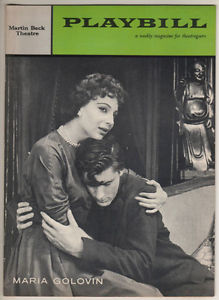 Television's favorite opera composer is back with a new production this week. It's Maria Golovin, the newest from Gian Carlo Menotti; commissioned by Peter Herman Adler, head of NBC Opera Theatre, it makes its television debut Sunday afternoon (4:00 p.m. CT) with a two-hour color broadcast. Maria Golovin is heavy stuff, telling the story of the romance between a blind, former POW and a married woman living in a European country a few years after a recent war.
Television's favorite opera composer is back with a new production this week. It's Maria Golovin, the newest from Gian Carlo Menotti; commissioned by Peter Herman Adler, head of NBC Opera Theatre, it makes its television debut Sunday afternoon (4:00 p.m. CT) with a two-hour color broadcast. Maria Golovin is heavy stuff, telling the story of the romance between a blind, former POW and a married woman living in a European country a few years after a recent war.Menotti was once famous enough that he appeared on the cover of Time magazine, and he won two Pulitzer Prizes in the '50s for his operas. By 1959, however, Menotti's star has begun to fade. Golovin receives only fair reviews, and his subsequent operas, such as the made-for-TV Labyrinth and The Last Savage, are poorly received. Today, he's a much-underrated composer; although his most famous composition, Amahl and the Night Visitors, continues to delight audiences young and old, most of his operas have fallen into disuse, which is a pity. Occasionally one comes across a revival of his Pulitzer-winning operas, The Consul (a brutal take on a totalitarian government) and The Saint of Bleecker Street, and Menotti deserves to one day be back in the opera house on a regular basis. I fear, however, that it will happen about the time opera makes a comeback on network television.
l l l
I'll note once again why something like NBC Opera Theatre can be seen on a Sunday afternoon—it's because sports on television is in 1959 nowhere near as prevalent as it is today. Saturday is the busier of the two days of the weekend. CBS has the NHL game of the week between the New York Rangers and Chicago Black Hawks at 1:30 p.m. while there are a pair of college basketball games on at 2:00 p.m. Cincinnati vs. Bradley on NBC, Missouri vs. Kansas State on ABC. A couple of made-for-TV bowling programs round out the day's sporting activity—and that's it. Sunday is even leaner, with the NBA game of the week between the St. Louis Hawks and Minneapolis Lakers (1:30 p.m., NBC) being the only major event, unless you want to include another bowling show, and a roller derby match between the San Francisco Bombers and the New York Chiefs (3:30 p.m., KWTX).
So what exactly did all-weekend sports replace on TV? Well, there are a lot of movies, Westerns, and Western movies that run on Saturday and Sunday afternoons. There are syndicated programs such as Mr. District Attorney on WFAA and Abbot and Costello on KFJZ. There are local and national variety shows, cartoons, and Sunday afternoon religious, news and public affairs programs. There's G-E College Bowl (this week: Notre Dame vs. Georgetown). There is, in fact, a great deal of diversity in the programming. Compared to the infomercials that too often dominate non-network hours today, I think that's not such a bad lineup.
l l l
Speaking of variety shows, we know that the golden age of variety has long since disappeared from television, but it's useful to see just how many shows there were in 1959. In fact, as we run through the week, we find at least one on each night, many with the sponsor's name as part of the title.
Saturday night has always been a good night for variety, and there's plenty of it this week. At 6:30 p.m., The Dick Clark Saturday Night Beech-Nut Show (try saying that five times fast) features Jaye P. Morgan (pre-Gong Show), Paul Anka and Dale Hawkins, and Fabian and the Coasters (on ABC, natch). That's followed at 7:00 by Red Foley's Country show Jubilee U.S.A., with Tex Ritter and the Schmitz Sisters (also on ABC); opposite that, Perry Como's colorcast on NBC has Ronnie Burns, Eve Arden (Our Miss Brooks) and Max Gallop. Lawrence Welk is on at 8:00 with what was known formally back then as the Dodge Dancing Party.
Sunday is Ed Sullivan's night, of course, and this week Ed's guests include Jane Russell and her younger brother Kevin, Shelly Winters, Fred MacMurray, Jan Murray, Joe Howard, David Seville and the Chipmunks, and Shecky Greene. (7:00 p.m., CBS) Before that, though, NBC has a program called Music Shop (last show of the series), hosted by Buddy Bregman and starring the great Billy Eckstine and Dodie Stevens. Steve Allen follows Music Shop (although next week Steve movies from 7:00 to 6:30, to get a half-hour jump on Ed). For this week, Steve's guests are Zsa Zsa Gabor, Vic Damone, Jane Harvey, Johnny Carson (!) and Earl "Father" Hines. NBC's variety show block concludes at 8:00 p.m. with The Dinah Shore Chevy Show, with Tony Randall, Ella Fitzgerald and Betty Grable.
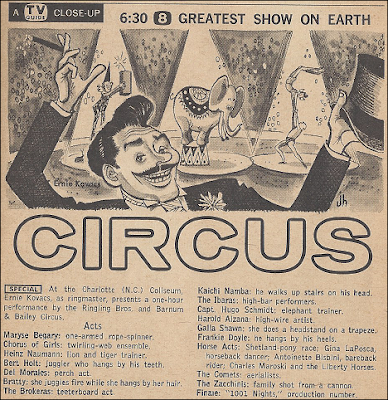 Monday has what I'd consider an unusual variety show: a special presentation of the Ringling Bros. and Barnum & Bailey Circus, with ringmaster Ernie Kovacs (6:30 p.m., ABC). I don't know if it lives up to its billing as The Greatest Show on Earth, but with a host like Kovacs it has to be fun. Then there's the Arthur Murray Dance Party (9;00 p.m., NBC), with Kathryn Murray interviewing Cornelia Otis Skinner, Rita Gam, Denise Darcel, Mitchell Parrish, Enzo Stuarti and Judy Lynn. Opposite that is The Patti Page Oldsmobile Show (9:00 p.m., ABC); Patti's guests are Duke Ellington and the Dukes of Dixieland. Edge to Patti there.
Monday has what I'd consider an unusual variety show: a special presentation of the Ringling Bros. and Barnum & Bailey Circus, with ringmaster Ernie Kovacs (6:30 p.m., ABC). I don't know if it lives up to its billing as The Greatest Show on Earth, but with a host like Kovacs it has to be fun. Then there's the Arthur Murray Dance Party (9;00 p.m., NBC), with Kathryn Murray interviewing Cornelia Otis Skinner, Rita Gam, Denise Darcel, Mitchell Parrish, Enzo Stuarti and Judy Lynn. Opposite that is The Patti Page Oldsmobile Show (9:00 p.m., ABC); Patti's guests are Duke Ellington and the Dukes of Dixieland. Edge to Patti there.On Tuesday, George Gobel and Eddie Fisher (aka Mr. Elizabeth Taylor) alternate in the 7:00 p.m. slot on NBC; this week, it's George's turn, and his guests this week are opera singer Patrice Munsel, Johnny Cash and Paul Lynde. Lucille Ball appears on Arthur Godfrey's show (8:00 p.m., CBS), followed by Red Skelton, with Cesar Romero and Terry Moore (8:30 p.m., CBS), and Garry Moore returns from vacation to welcome Ed Wynn, Jane Powell, the Mills Brothers and Sue Carson (9:00 p.m., again on CBS).
Lawrence Welk is back on Wednesday with Lawrence Welk's Top Talent (7:30 p.m., ABC), while NBC counters with Milton Berle on the Kraft Music Hall, with guest Martha Raye. Thursday night sees The Pat Boone Chevy Showroom with Maureen O'Hara (8:00 p.m., ABC), while on The Ford Show (the car, not the entertainer), Tennessee Ernie Ford (the entertainer, not the car) welcomes special guest Liberace. There's no regular show scheduled for Friday, but Bob Hope's back with another of his specials (7:00 p.m., NBC), featuring Julie London, Guy Mitchell, Chuck Conners, Fess Parker and Gail Davis. It's sponsored by Chrysler, of course.
If that isn't enough, there are also Monday through Friday daytime variety shows: Arthur Godfrey's back every morning at 9:30 on CBS, The Peter Lind Hayes Show features on ABC at 11:30 a.m., Jimmy Dean has a show on CBS at 1:00 p.m,, as does Liberace on ABC, Art Linkletter's House Party follows Jimmy at 1:30 p.m. (CBS), Bert Parks hosts County Fair at 3:30 p.m. on NBC, and we can't forget Dick Clark and American Bandstand at 4:00 p.m. on ABC. And then, lest we forget, there's Jack Paar's late night Tonight show. If you include those, you come up with, I think 57, plus two specials for the week.* Granted, there were only four stations in most markets back then, but there really is something for everyone, don't you think?
*This statistic brought to you by Heinz.
l l l
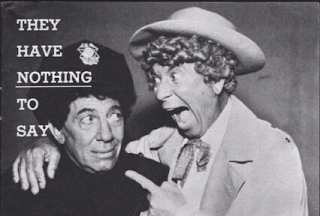 Finally, there's the show I would have wanted to see that week: Sunday's G.E. Theater (8:00 p.m., CBS) presents "The Incredible Jewel Robbery," a comedy without dialog starring Harpo and Chico Marx as two criminals plotting a jewelry-store robbery. With Groucho hosting You Bet Your Life on Thursdays, that means the three biggest Marx brothers are all on television this week. (There's also, according to TV Guide, an unbilled cameo from a mustachioed gentleman who, contractually, must remain anonymous.) And if that isn't "the most ridiculous thing I've ever heard," try this: you can
watch the episode on YouTube
.
Finally, there's the show I would have wanted to see that week: Sunday's G.E. Theater (8:00 p.m., CBS) presents "The Incredible Jewel Robbery," a comedy without dialog starring Harpo and Chico Marx as two criminals plotting a jewelry-store robbery. With Groucho hosting You Bet Your Life on Thursdays, that means the three biggest Marx brothers are all on television this week. (There's also, according to TV Guide, an unbilled cameo from a mustachioed gentleman who, contractually, must remain anonymous.) And if that isn't "the most ridiculous thing I've ever heard," try this: you can
watch the episode on YouTube
.I've said it before, but for all the trouble it causes, technology can be a wonderful thing. TV
Published on March 05, 2022 05:00
March 4, 2022
Around the dial

 Xf these aren't crisis times right now, I don't know what is. And yet it's also true that life keeps going on; it's important to realize that it does no good to worry about things that are out of your control. You pray about them, and then move on and get on with life—after all, we only get one shot at it. At Comfort TV David looks back at how television has always been
a source of relief
during those times, and why those programs can still work for us today.
Xf these aren't crisis times right now, I don't know what is. And yet it's also true that life keeps going on; it's important to realize that it does no good to worry about things that are out of your control. You pray about them, and then move on and get on with life—after all, we only get one shot at it. At Comfort TV David looks back at how television has always been
a source of relief
during those times, and why those programs can still work for us today.At Garroway at Large, Jodie provides a welcome update on the progress of her Garroway biography , focusing on adventures with gaining access to reproducing various photos of the Master Communicator. (I thought focusing was a good way to describe that, don't you?) I'll really be ready to enjoy this book when it's published.
The Flaming Nose is back with a tribute to The Musketeers , the 2014 BBC adaptation of the Dumas classic that's been so much a part of the adventure genre. A very interesting note: "Twenty years ago, there were 182 series produced. Today, that number has exploded to 559 series." And even so, it can be hard to find gems in all that content.
Let's keep the accent on Britain with Cult TV, and an episode from the BBC comedy Rutland Weekend Television , which John describes as "a Pythonesque account of the nature of television itself." Now, I'm not sure how much more you can satirize television than its reality, but they managed to do it.
At A Shroud of Thoughts, Terence says farewell and looks back at the career of Sally Kellerman , who died last week aged 84. She was a mainstay on television in the 1960s before moving to the big screen, but continued her TV work into the 21st Century.
Television's New Frontier: The 1960s investigates the 1962 episodes of the curious series Thriller . I say "curious" because this series never seemed to quite figure out what it was supposed to be, and never really utilized Boris Karloff to the best advantage. As a whole, it should have been better than it was, but it still has some stellar episodes.
At Shadow & Substance, Paul looks back at how Rod Serling's attitude toward " the right length for a Twilight Zone " changed over time. (Get it?) At first, Rod thought an hour was the perfect length, but by the time CBS asked him to lengthen the show, he'd come to see that a tightly-written 30 minute script can say a lot.
Care for a little self-promotion? At Eventually Supertrain, yours truly is back with Dan Budnick talking about Search. Sadly, it's the next-to-last episode, so don't miss it! Also on the show, The Night Stalker and Battlestar Galactica.
And ending on a light note, here's Martin Grams with some very funny cartoons featuring the Lone Ranger and Tonto . If we must face the crisis, we might as well do so with a smile. TV
Published on March 04, 2022 05:00
March 2, 2022
The "Clash of the Indies" Game

 Friend of the blog Mark Waldow, who's contributed many swell TV Guide issues for review over the last year (including last Saturday's), has an interesting idea I think you might enjoy. I'll let him explain it:
Friend of the blog Mark Waldow, who's contributed many swell TV Guide issues for review over the last year (including last Saturday's), has an interesting idea I think you might enjoy. I'll let him explain it:I think this could be a fun feature--which I call "Clash of the Indies".
Take two independent stations of similar market size and channel # and compare their lineups for a specific day. For example, here are the listings for two channel 11's for July 29, 1975:

You could compare the lineups either timeslot by timeslot or just overall average. Also, I think anonymity helps objectivity, so I'll tell you who Station X is after you judge. Interesting fact: I watched Station X on the day listed and WTCN the next day.
So what do you think out there in "It's About TV" land, especially those of you with substantial TV Guide collections? Anyone interested in taking a guess, or offering your own entry in what could become a regular feature? And be sure to stay tuned for the answer! TV
Published on March 02, 2022 05:00
February 28, 2022
What's on TV? Tuesday, March 3, 1964

 Change is in the air with this week's Portland (Oregon) edition. Effective Sunday, KATU, Channel 2, becomes the new ABC affiliate, while KPTV, Channel 12, is now an independent. The moves are accompanied with plenty of advertising; today's pages include ads for Combat! and The Fugitive from KATU, "Now ABC in Portland," while KPTV introduces a new slate of programs, including Thriller, Strikes and Spares, and tonight's debut of the excellent British series The Human Jungle (which I mentioned on Saturday). In sports, the old saying is that "you can't tell the players without a scorecard"; in the case of television, you can't tell the shows without TV Guide. Ah, what a great ad that would have been.
Change is in the air with this week's Portland (Oregon) edition. Effective Sunday, KATU, Channel 2, becomes the new ABC affiliate, while KPTV, Channel 12, is now an independent. The moves are accompanied with plenty of advertising; today's pages include ads for Combat! and The Fugitive from KATU, "Now ABC in Portland," while KPTV introduces a new slate of programs, including Thriller, Strikes and Spares, and tonight's debut of the excellent British series The Human Jungle (which I mentioned on Saturday). In sports, the old saying is that "you can't tell the players without a scorecard"; in the case of television, you can't tell the shows without TV Guide. Ah, what a great ad that would have been.-2- KATU (ABC) Morning 7:45 ALMANAC—Brumfield 8:00 CARTOONIVAL—Rusty Nails 8:30 ROMPER ROOM—Miss Gail 9:00 NEWS—Bruce Baer 9:30 OUR MISS BROOKS—Comedy 10:00 DIVORCE COURT—Drama 11:00 PRICE IS RIGHT—Bill Cullen 11:30 OBJECT IS—Dick Clark Guests: Arlene Dahl, Carl Ballantine, Barry Sullivan Afternoon 12:00 SEVEN KEYS—Jack Narz 12:30 FATHER KNOWS BEST 1:00 ERNIE FORD—Variety 1:30 BARNEY AND FRIENDS 1:50 NEWS—Doug Ramsey 2:00 ANN SOTHERN—Comedy 2:30 DAY IN COURT—Drama 2:55 NEWS—Lisa Howard 3:00 GENERAL HOSPITAL—Serial 3:30 QUEEN FOR A DAY—Bailey 4:00 TRAILMASTER—Western 5:00 LEAVE IT TO BEAVER 5:30 DOBIE GILLIS—Comedy Evening 6:00 NEWS—Pat Wilkins 6:15 NEWS—Ron Cochran 6:30 BEST OF GROUCHO—Game 7:00 WINSTON CHURCHILL RETURN 7:30 COMBAT!—Drama 8:30 McHALE’S NAVY—Comedy 9:00 GREATEST SHOW—Drama COLOR 10:00 FUGITIVE—Drama 11:00 NEWS 11:30 STEVE ALLEN—Variety Guest: Dorothy Dandridge
-6- KOIN (CBS) Morning 7:00 SUNRISE SEMESTER Outlines of Art: “The High Renaissance” 7:30 WEATHER 8:00 CAPTAIN KANGAROO—Children 9:00 NEWS—Mike Wallace 9:30 I LOVE LUCY—Comedy 10:00 McCOYS—Comedy 10:30 PETE AND GLADYS—Comedy 11:00 LOVE OF LIFE—Serial 11:25 NEWS—Robert Trout 11:30 SEARCH FOR TOMORROW 11:45 GUIDING LIGHT—Serial Afternoon 12:00 NEWS—Bill Hoyt 12:05 HI NEIGHBOR—Variety 12:30 AS THE WORLD TURNS 1:00 KOIN KITCHEN—Betty Davis 1:30 HOUSE PARTY—Art Linkletter 2:00 TO TELL THE TRUTH—Panel Panelists: Dick Shawn, Joan Fontaine, Barry Nelson, Phyllis Newman 2:25 NEWS 2:30 EDGE OF NIGHT—Serial 3:00 SECRET STORM—Serial 3:30 PASSWORD—Allen Ludden 4:00 CARTOON CIRCUS—Children 4:15 MOVIE—Adventure “Shoot First” (1953) 5:00 CARTOON CORRAL COLOR Evening 6:00 NEWS—Chuck Foster 6:30 NEWS—Walter Cronkite 7:00 CAIN’S HUNDRED—Police 8:00 RED SKELTON—Comedy Guest: Liberace 9:00 PETTICOAT JUNCTION 9:30 JACK BENNY—Comedy 10:00 GARRY MOORE—Variety Guests: Dorothy Provine, Charlotte Rae, Norm Crosby 11:00 NEWS 11:15 TEXAN—Western
-8- KGW (NBC) Morning 6:25 TOWN AND COUNTRY—Jones 6:30 CLASSROOM—Science 7:00 TODAY—Hugh Downs 8:00 CARTOONERS’ CLUB 8:20 TELESCOPE—Variety COLOR 9:00 25 NEWS—Edwin Newman 9:30 WORD FOR WORDS COLOR 10:00 CONCENTRATION—Hugh Downs 10:30 MISSING LINKS—Ed McMahon COLOR Guests: Phyllis Kirk, Nipsey Russell, Jerry Shayne 11:00 YOUR FIRST IMPRESSION COLOR Guests: Jeff Donnell, Dennis James. Host: Bill Leyden 11:30 TRUTH OR CONSEQUENCES—Bob Barker COLOR 11:55 NEWS—Ray Scherer Afternoon 12:00 LET’S MAKE A DEAL COLOR 12:25 NEWS—Floyd Kalber 12:30 DOCTORS—Serial 1:00 LORETTA YOUNG—Drama 1:30 YOU DON’T SAY!—Kennedy COLOR Guests: Gloria De haven, Pernell Roberts 2:00 MATCH GAME—Gene Rayburn Guests: Morey Amsterdam, Carmel Quinn 2:25 NEWS 2:30 MAKE ROOM FOR DADDY 3:00 BACHELOR FATHER—Comedy 3:30 MOVIE—Drama “Laddie” (1940) 5:30 YOGI BEAR—Cartoons Evening 6:00 NEWS—Huntley, Brinkley 6:30 NEWS—Richard Ross 7:00 BACHELOR FATHER 7:30 MR. NOVAK—Drama 8:30 YOU DON’T SAY—Tom Kennedy COLOR Guests: Pat Carroll, Gary Lockwood 9:00 RICHARD BOONE—Drama 10:00 OUR MAN IN WASHINGTON SPECIAL COLOR “Bell Telephone Hour” will not be seen. 11:00 NEWS 11:30 JOHNNY CARSON COLOR
10 KOAP (EDUC.) Morning 9:00 TELECOURSE—Hygiene 9:45 LANGUAGE—Spanish 10:00 TELECOURSE—Psychology 10:45 PARLONS FRANCAIS I 11:00 TELECOURSE—Hygiene Afternoon 1:00 PARLONS FRANCAIS I 1:30 EXPLORING NATURE 2:00 ROOTS AND BRANCHES 2:30 LET’S EXPLORE SCIENCE 2:45 INDUSTRY ON PARADE 3:00 AMERICAN ECONOMY 3:30 TEACHERS’ FRENCH 4:00 SCIENCE FOR TEACHERS Evening 7:00 WHAT’S NEW-Children 7:30 FAMILY CASTLE 8:00 TELECOURSE—Literature 8:30 HEADLINE REACTION 9:00 TELECOURSE—Music 9:30 POET’S EYE—Svendsen 10:00 GREAT DECISIONS—1964
12 KPTV (IND.) Morning 7:30 THREE STOOGES—Comedy 7:45 DR. ZOOM’S CARTOONS 8:15 KING LEONARDO—Cartoons 8:30 CARTOON CASTLE—Children 9:00 JACK LA LANNE—Exercise 9:30 MOVIE—Mystery “The Gay Falcon” (1941) 11:30 RAMAR OF THE JUNGLE Afternoon 12:00 ROBIN HOOD—Adventure 12:30 BURNS AND ALLEN—Comedy 1:00 LIFE OF RILEY—Comedy 1:30 GIRL TALK—Panel Panelists: Yvonne DeCarlo, Nancy Andrews, Joyce Gordon 2:00 MOVIE—Comedy “Honeymoon in Bali” (1939) 4:00 NEWS—Ed Arndt 4:15 PEOPLE ARE FUNNY 4:45 MICKEY MOUSE CLUB 5:15 ROCKY AND HIS FRIENDS 5:30 POPEYE’S PIER 12—Children Evening 6:00 RIFLEMAN—Western 6:30 WANTED—DEAD OR ALIVE 7:00 LAWMAN—Western 7:30 THRILLER—Mystery RETURN 8:30 HUMAN JUNGLE—Drama DEBUT 9:30 NEWS—Ed Arndt 10:00 MOVIE-Drama “Crack-up” (1946)
TV
Published on February 28, 2022 05:00
February 26, 2022
This week in TV Guide: February 29, 1964

 From 1963 through 1969, ABC broadcast a very good series of historial documentary specials under the umbrella title The Saga of Western Man, produced by
author
and ABC News correspondent John Secondari and his wife, Helen Jean Rogers. The series focused on the people and events that Secondari and Rogers felt had propelled the development of Western civilization—from the birth of Christ to the life of DaVinci to Columbus and the discovery of America.*
From 1963 through 1969, ABC broadcast a very good series of historial documentary specials under the umbrella title The Saga of Western Man, produced by
author
and ABC News correspondent John Secondari and his wife, Helen Jean Rogers. The series focused on the people and events that Secondari and Rogers felt had propelled the development of Western civilization—from the birth of Christ to the life of DaVinci to Columbus and the discovery of America.**I've often wondered why no one has ever made a series out of Will and Ariel Durant's 11-volume work, The Story of Civilization. Maybe this is as close as they'll ever come.
On Saturday night at 7:30 p.m. PT, the topic is "1898"—the year that "marked America's emergency as a world power." It was a significant year indeed: the Indian wars had been concluded, the age of the oil, railroad and steel barons was upon us, and immigrants were providing low-cost labor. Perhaps most significant was the emergence of a figure who was to become larger than life on the American scene: Theodore Roosevelt.* As Assistant Secretary of the Navy, Roosevelt played a key role in the construction of what would be known as the Great White Fleet, famous for their 1907 tour around the world (at the command of none other than President Theodore Roosevelt); later in the year, Roosevelt would lead his Rough Riders against Spanish troops in Cuba. If you want to argue that this was a watershed year in American history—the birth of the modern America, if you will—then I won't disagree with you.
*Actor Sidney Blackmer, who played Roosevelt a dozen times in the movies, provides T.R.'s voice in various readings.
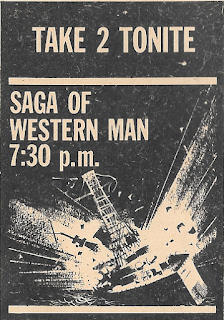 The destruction of the Maine, which
The destruction of the Maine, whichled to the Spanish-American WarYou wouldn't have a series like The Saga of Western Man on network television today, for a variety of reasons besides the fact that none of the commercial networks would ever run a series of historical documentaries in primetime. For one thing, it couldn't be called "Man," for reasons I hardly need to explain. You couldn't treat Western civilization as something to be celebrated, either; we all know that the West is the source and summit of everything that's wrong with the world. And you couldn't talk of the United States as a world power, because it isn't one anymore; born in 1898, one could say that it died in 2021. If this country has become a laughingstock in the world, it's only because it has fallen so far.
I wonder what Theodore Roosevelt, who believed in what one might call "Muscular Americanism," would think of all this. For that matter, what would John Secondari think of it?
l l l
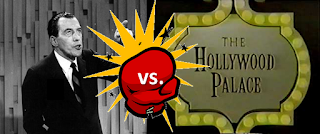 During the 60s, the Ed Sullivan Show and The Hollywood Palace were the premiere variety shows on television. Whenever they appear in TV Guide together, we'll match them up and see who has the best lineup..
During the 60s, the Ed Sullivan Show and The Hollywood Palace were the premiere variety shows on television. Whenever they appear in TV Guide together, we'll match them up and see who has the best lineup..Sullivan: Ed welcomes songstress Anita Bryant; comic Jack Carter; ventriliquist Rickie Layne and his little pal Velvet; and Julius Monk's "Baker's Dozen" revue.
Palace: Host Efrem Zimbalist Jr. shares some laughs with his old 77 Sunset Strip buddy Louis Quinn and introduces Kate Smith; the Great Wallendas, high-wire artists; Roy Rogers, Dale Evans, Trigger and the Sons of the Pioneers; comedian Corbett Monica of The Joey Bishop Show; and Albert Rix and his trained Russian Bears.
First things first: as far as novelty acts go, I'll take trained bears over ventriliquists any day. Now, I always thought and still think Anita Bryant had a lovely voice, and Jack Carter can be very funny at times. But let's be real: Kate Smith and Roy Rogers and Dale Evans (with or without Trigger) are quality headliners. The Flying Wallendas were and may still be the most famous high-wire act in history (and were even moreso then, when they were only two years removed from their tragic accident in Detroit ). With all that, Efrem Zimbalist and Louis Quinn (who played Roscoe on Sunset Strip and must have been there for comic relief) are just icing on the cake. It's an easy call: The Palace takes the honors.
l l l
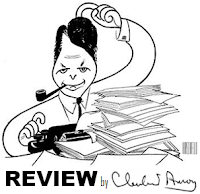 Throughout the 60s and early 70s, TV Guide's weekly reviews were written by the witty and acerbic Cleveland Amory. Whenever we get the chance, we'll look at Cleve's latest take on the shows of the era.
Throughout the 60s and early 70s, TV Guide's weekly reviews were written by the witty and acerbic Cleveland Amory. Whenever we get the chance, we'll look at Cleve's latest take on the shows of the era. Bill Dana's character José Jiménez ("My name José Jiménez") debuted on The Steve Allen Show in 1959, and rode the contrails of the Mercury astronauts to stardom (he was a favorite of the flyboys, who found his astronaut skit hilarious); after appearing as a character in Make Room for Daddy, it's not a surprise that in 1963, at the height of his popularity, he was spun off into his own sitcom, which probably could have been called José Jiménez but instead carried the title The Bill Dana Show when it premiered on NBC.
As Cleveland Amory describes him, José is "the little man fighting to better himself but convinced, due to his helpful nature, that every man was put on earth to better his fellow men." He works as a bellhop at the Park Central Hotel in New York; naturally, he is the nemesis of his boss (Jonathan Harris) and the house detective (Don Adams), and proves a frustration to his fellow bellhop Eddie (Gary Crosby), who was trying to keep José from being taken advantage of.
Predictable, to be sure, and not terribly sophisticated, but not without its charms, according to Cleve. "[I]f slapstick is your dish," he writes, "you'll get plenty of it in this show and even if it's not, once in a while you'll get a genuinely funny splituation." Much of the humor comes from José's naivety and fractured English, such as when he decides to become a "financial typhoon" by buying stock in the hotel. During the shareholder's meeting, when the chairman rules him out of order, he replies, "No, I'm not. I had a physical last week." And when the chair finally recognizes him, José responds, "You do? I don't know you." Not everyone's cup of TV, Amory acknowledges, but how many people go to a hotel for the television anyway?
l l l
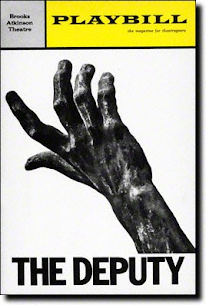 Some interesting notes in the margins this week, so to speak. On NBC's Sunday afternoon newsmagazine, appropriately named Sunday and hosted by Today newscaster Frank Blair (3:00 p.m. PT), drama critic William K. Zinser reviews the "controversial Broadway play" The Deputy, written by German playwright Rolf Hochhuth, and the word "controversial" is something of an understatement. To this point in history, Pope Pius XII had generally been regarded, by Christian and Jew alike, as a moral and humanitarian hero of World War II; Hochhuth, instead, presented the pope as antisemetic, indifferent to the suffering of the Jews and sympathetic to Nazi Germany, which he saw as a geopolitical balance against the Soviet Union.
Some interesting notes in the margins this week, so to speak. On NBC's Sunday afternoon newsmagazine, appropriately named Sunday and hosted by Today newscaster Frank Blair (3:00 p.m. PT), drama critic William K. Zinser reviews the "controversial Broadway play" The Deputy, written by German playwright Rolf Hochhuth, and the word "controversial" is something of an understatement. To this point in history, Pope Pius XII had generally been regarded, by Christian and Jew alike, as a moral and humanitarian hero of World War II; Hochhuth, instead, presented the pope as antisemetic, indifferent to the suffering of the Jews and sympathetic to Nazi Germany, which he saw as a geopolitical balance against the Soviet Union. Huchhuth's portrayal of Pius as the "heartless, money-grasping pontiff "who turned a blind eye to the Holocaust has become something of a cause celebre among the jejune literati, butressed by historical slanders such as Hitler's Pope by the liberal Catholic John Cornwall. We now know, for example, that the storyline was probably a product of General Ivan Agayants, chief of the KGB's disinformation department, as part of a Soviet campaign to discredit and defame Pius—a campaign that, it must be admitted, has been largely successful in popular culture. It's only been in the last few years that the pontiff's reputation has started to be rehabilitated, with the publication of several books corroborating Pius' efforts on behalf of the Jews. But, as they say, the smear story always appears on page one, while the retraction appears in the small print on page 70.
In case you're wondering if I've actually read The Deputy, I have a copy in my library, which I used while researching my book The Collaborator. It's unorthodox, mildly interesting, and totally slanderous.
Speaking of politics, as we tangentially have been, on Thursday night ABC News Reports previews next Tuesday's New Hampshire presidential primary (10:30 p.m.). If you'd asked experts six months ago what to expect, they'd have said that the Democratic half of the equation would be pretty quiet, with an incumbent president running unopposed, while the Republican side could present fireworks and possibly a surprise winner. Well, they were right—and yet not at all in the way they thought.
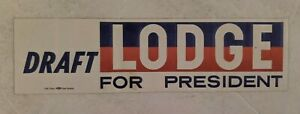
The incumbent Democrat does indeed win, but his name is Lyndon B. Johnson instead of John F. Kennedy, and that still takes a lot of getting used to, a little over three months after the fact. Meanwhile, although Barry Goldwater and Nelson Rockefeller are the principal Republicans, the winner is a total shock: not former Vice President Richard Nixon, or Michigan Governor George Romney, or Pennsylvania Governor William Scranton, or any of the other establishment figures. Instead, first place goes to a man who didn't campaign nor set foot in the state, and who's name isn't even on the ballot: Henry Cabot Lodge Jr., current U.S. ambassador to South Vietnam, and formerly a U.S. senator from Massachusetts and Nixon's running mate in 1960. The Lodge write-in campaign, driven by four friends "looking for something exciting to do," and run out of a small office in Concord, is one of the great stories in modern politics, made even moreso by comparison to the precise, poll-driven methods of today. You can read all about this remarkable story here .
l l l
On Monday, Leslie Uggams and Bob McGrath are among the soloists on Sing Along With Mitch (10:00 p.m., NBC). According to the TV Teletype, Sing Along may be headed for ABC next season, having been bumped out of its Monday night slot (in favor of The Alfred Hitchcock Hour); the network thinks it would make an ideal Saturday night companion to The Lawrence Welk Show. For whatever reason, the Miller-ABC merger never happens, and the slot following Welk winds up going to The Hollywood Palace.
KPTV, the former ABC affiliate in Portland, Oregon, is, as of March 1, an independent station (while former independent KATU is now tied to ABC). As a result of the switch, the station has a new lineup, including, on Tuesday, the British drama The Human Jungle (8:30 p.m.), starring Herbert Lom as psychiatrist Dr. Roger Corder. I've written about this series before and will again; it's an excellent, edgy series that illustrates how fragile and yet resiliant the human mind is, and anyone who knows Lom primarily from the Pink Panther movies will be in for a surprise.
The U.S.S. Thresher is very much in the news in March, 1964. The nuclear-powered submarine sank on April 10, 1963 during deep-diving tests off the Massachusetts coast, killing all 129 aboard. Wednesday, CBS Reports looks back at "The Legacy of the Thresher" (7:30 p.m.), including footage taken by the bathyscaphe Trieste shortly after the sinking. (Reports vary as to the cause of the accident; the details are in this fascinating Popular Mechanics artice .) Many years later, a secret mission, funded by the Navy and conducted by oceanographer Robert Ballard, used the submersible Alvin to gather data on the wreckage sits of the Thresher and another atomic submarine, the U.S.S. Scorpion. In return for Ballard's work, the Navy allowed him to continue to use the submersible for a project of his own, which the Navy then used as a cover story to keep the mission secret. Ballard's project: his search for the wreckage of the Titanic.
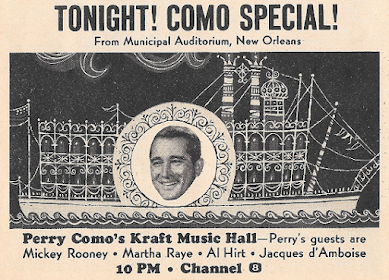 Perry Como has been a mainstay on television since 1948, and host of the Kraft Music Hall since 1959. But now, Mr. C is scaling back a bit, and beginning with this 1963-64 season, he's replaced the weekly grind with seven specials a year—arena shows set in different cities around the country. On Thursday, Perry broadcasts from Municipal Auditorium in New Orleans, with his guests Mickey Rooney, Martha Raye, Al Hirt, and ballet dancer Jacques d'Amboise. (10:00 p.m., NBC)
Perry Como has been a mainstay on television since 1948, and host of the Kraft Music Hall since 1959. But now, Mr. C is scaling back a bit, and beginning with this 1963-64 season, he's replaced the weekly grind with seven specials a year—arena shows set in different cities around the country. On Thursday, Perry broadcasts from Municipal Auditorium in New Orleans, with his guests Mickey Rooney, Martha Raye, Al Hirt, and ballet dancer Jacques d'Amboise. (10:00 p.m., NBC)Friday, it's part one of the two-part series finale of Route 66 (8:30 p.m., CBS), and Tod Stiles (Martin Milner), who's spent four years chasing girls without being caught, may have finally met his match: the eccentric members of the Tifin family are trying to marry off their niece as a condition of inheriting $5 million, and they think Tod would make the perfect groom. Their advantage: the bride-to-be is Barbara Eden. I ask you, who could pass up that opportunity?
l l l
Finally, the starlet who's already a star: 18-year-old Zina Bethune, who plays student nurse Gail Lucas on the CBS series The Nurses. Zina's hardly a newcomer to the entertainment scene, pursuing dual careers in acting and dancing; at 6, she was appearing off-Broadway; at 7 she was in George Ballanchine's School of American Ballet and was a lead in The Nutcracker by the time she was 10, and in a TV production of Tennessee Williams' This Property is Condemned. She's a veteran of The Guiding Light and Young Doctor Malone, Broadway plays, movies, and TV guest apperances. In fact, as Alan Gill notes in this week's cover story, "she hasn't missed much—except the experience of being young."
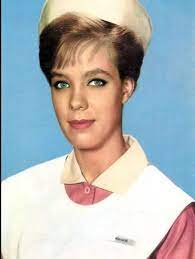 Shirl Conway, who plays mentor Liz Thorpe—we're in the era of shows featuring an older mentor imparting wisdom to the young student, after all, and Conway is Dr. Gillsepie to Bethune's Dr. Kildare—says, "That kid is more worried at being 18 than I was at turning 47," and adds, "Oh, I'd like to see her run in the fields." Zina herself acknowledges that "I'm at the beginning of a road —a long, lonely road. Eventually, I'll get married. I want companionship." But she takes pride in her work; Conway says that this role "hasn't shown what she's got by a hell of a long shot. The kid's an actress."
Shirl Conway, who plays mentor Liz Thorpe—we're in the era of shows featuring an older mentor imparting wisdom to the young student, after all, and Conway is Dr. Gillsepie to Bethune's Dr. Kildare—says, "That kid is more worried at being 18 than I was at turning 47," and adds, "Oh, I'd like to see her run in the fields." Zina herself acknowledges that "I'm at the beginning of a road —a long, lonely road. Eventually, I'll get married. I want companionship." But she takes pride in her work; Conway says that this role "hasn't shown what she's got by a hell of a long shot. The kid's an actress."The Nurses lasts on television for three seasons, until 1965; for the last season, it's known as The Doctors and the Nurses, and brings on Michael Tolan and Joseph Campanella as the titular doctors. It then winds up as a daytime soap for a couple of years on ABC, under its original title and with the same characters, but not played by the same actresses. So although she's no stranger to daytime drama, Zina doesn't make the transition.
She does, however, go on to make her mark in many ways; her best-known role might be opposite Harvey Keitel in Martin Scorsese’s 1967 movie Who’s That Knocking at My Door. She founds her own dance company, Bethune Theatredanse, and choreographs more than 50 works. She becomes involved in animal rights, and she does marry, to actor Sean Feeley, with whom she is still married when she dies in 2012 as the result of a hit-and-run accident. TV

Published on February 26, 2022 05:00
February 25, 2022
Around the dial

 The news right now is very, very bad, or very depressing, or (in all likelihood) both. And some probably think that looking at old television shows is a waste of time, when there are more important things to deal with. But I like to think that, as my friend David Hofstede says, this "comfort TV" can help give us a breather, even if it's just temporary. So let's take one right now.
The news right now is very, very bad, or very depressing, or (in all likelihood) both. And some probably think that looking at old television shows is a waste of time, when there are more important things to deal with. But I like to think that, as my friend David Hofstede says, this "comfort TV" can help give us a breather, even if it's just temporary. So let's take one right now.In fact, we'll start at Comfort TV today, where David uses Rémi Brague's book Curing Mad Truths: Medieval Wisdom for the Modern Age (which I think I'll have to get) as the basis for looking back at how the era of classic TV provides us with some essential truths about our culture . Not only thought-provoking, but spot-on.
At bare•bones e-zine, Jack's Hitchcock Project continues with the second of Lewis Davidson's scripts for the show, the tenth-season story "Misadventure," a nasty little domestic drama starring Barry Nelson, Lola Albright and George Kennedy, and filled with more twists and turns than the Nürburgring .
Speaking of Hitchcock (I love these smooth transitions, as you know), Rick at Classic Film & TV Café is on the case with another installment of the Movie Quote Game ; the subject, as if you didn't already know, is quotes from Hitchcock films. How well do you know them?
The Hitchcock shows, both 30- and 60-minute versions, exist in their entirety. John's current Cult TV feature focuses on shows that have only a very few surviving episodes, and this week his eyes fall on the Saturday Night Theater episode " A.D.A.M. ," and the fear of technology—a prudent fear, I'd say.
In going through old TV Guides, one finds, in the early days of public broadcasting, the children's classics Sesame Street, The Electric Company, and Mister Rogers' Neighborhood. But for a short time, there was also ZOOM , which we read about at the Broadcasting Archives.
Drunk TV takes us back to the 1970s, as Paul looks back at "a true gem," the 1979 TV-movie Breaking Up is Hard to Do , taking us behind the scenes in the world of formerly married men. Ted Bessell, Jeff Conaway, Robert Conrad, Billy Crystal, Tony Musante, and David Ogden Stiers star—you can't do much better than that.
That's it for the week; in the meantime, pray for peace. TV
Published on February 25, 2022 05:00
February 23, 2022
The Descent into Hell: "A Taste of Armageddon" (1967)
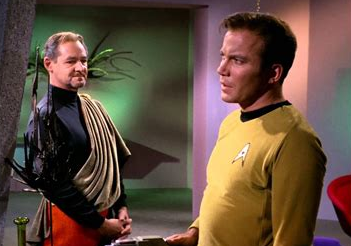
 Someone once said that hindsight is 20/20.* Now, I don’t think that’s always true, but part of being a cultural archaeologist involves sifting through the detritus left by the past, searching for the clues that give us an idea of how the present came to be. Think of it as operating in the same way that an arson investigator goes about looking for evidence—always asking the question, What happened here? And how?
Someone once said that hindsight is 20/20.* Now, I don’t think that’s always true, but part of being a cultural archaeologist involves sifting through the detritus left by the past, searching for the clues that give us an idea of how the present came to be. Think of it as operating in the same way that an arson investigator goes about looking for evidence—always asking the question, What happened here? And how? *In fact, the saying, “Most people's hindsight is 20-20" is generally attributed to humorist Richard Armour.
It’s especially true when it comes to the wreckage of a civilization. How could such a thing happen? We wonder. It’s an especially unsettling time, and try as we might to remain dispassionate, we can’t help phrasing the question in the first person, as if we’re looking in the mirror.
How did we allow this to happen?
l l l
The Star Trek episode "A Taste of Armageddon" 3first aired on February 23, 1967, and it finds the crew of the Enterprise confronted with a confounding scenario: a war in which no shots are fired, but people still die. How can this be?
The planets Eminiar VII and Vendikar have been at war for five hundred years (and you thought the Hundred Year War between England and France was bad). During that time, millions of people have died, casualties of the back-and-forth attacks between the two planets. In fact, shortly after Kirk and company arrive on the surface, another fusion bomb attack occurs, with more deaths resulting. However, the crew has observed no explosions, seen no damage, witnessed no bloody and battered bodies. And then they learn the truth of the situation.
Yes, there was a real war, once upon a time, and there was death and destruction to accompany it. So much so, in fact, that the leaders of the two planets realized what Robert E. Lee had so famously said, that "It is well that war is so terrible, otherwise we should grow too fond of it." But whereas the American Civil War ended thanks to the determination of Lee's adversary, Ulysses S. Grant, that the best way to end a war is to win it, the war between Eminiar VII and Vendikar took an entirely different tack.* Realizing that neither society can continue to absorb the material destruction caused by the conflict, and apparently resigned to the irreconcilability of their dispute, they opt to make things cleaner, more sanitary, more socially acceptable, by replacing actual battle with a computer simulation, one in which "Attacks are launched in concept [and] casualties established through statistical adjustment."
*Probably because the woke teachers of the future, having cancelled Lee out of American history, never passed on his prescient observation to future generations.
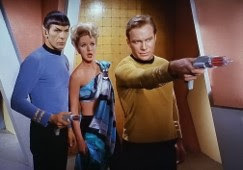 Kirk takes matters into his own hands, again.But there's a deadly twist to all this: once the statistical fatalities have been determined, those presumed to have been killed in the attack have 24 hours to show up at a disintegrator chamber to fulfill the terms of the agreement between the combatants. If either side reneges, the other is free to launch an actual attack, complete with all the horror that the leaders have decided is too messy. And there's a deadlier twist, one that provides the impetus for the story's resolution: Kirk and his landing party, as well as the Enterprise and her crew, have been counted among the fatalities, and are told to report to the disintegrator chamber to be killed.
Kirk takes matters into his own hands, again.But there's a deadly twist to all this: once the statistical fatalities have been determined, those presumed to have been killed in the attack have 24 hours to show up at a disintegrator chamber to fulfill the terms of the agreement between the combatants. If either side reneges, the other is free to launch an actual attack, complete with all the horror that the leaders have decided is too messy. And there's a deadlier twist, one that provides the impetus for the story's resolution: Kirk and his landing party, as well as the Enterprise and her crew, have been counted among the fatalities, and are told to report to the disintegrator chamber to be killed.The story, coming as it does in the midst of the Vietnam War, is obviously intended to serve as an allegory on how man has to find a way to settle conflicts peacefully. Therefore, it creates a pair of apparent absurdities: 1) what will the authorities do if you don't show up to be disintegrated? Kill you? and 2) wouldn't it just be easier to find a solution that both sides can live with, especially since they were apparently able to negotiate this crazy computer scheme?*
*Pete Seeger might have written a song called "Waste Deep in the Big Disintegrator" if he'd been in this future.
The answer to the second question is the moral of the story, that as Churchill once said, "Meeting jaw to jaw is better than war."* But what about that first point, that there seems to be little in the way of incentive to voluntarily give yourself up to death? What can the authorities do?
*Since Churchill was a dead white European male, his lesson was obviously never passed on to future generations, either.
Well, they can remind you that disintegration is a hell of a lot less painful than being shot with a phaser, and I think that's a point to this story that's underappreciated, that there is a risk-averse aspect to this future life, one that mirrors our current obsession with avoiding suffering at any cost. Isn't that what euthanasia is about, after all? Far better to simply slip away with a pill or an injection than to experience the pain of a cruel death.
Fortunately, Captain Kirk has always understood this kind of thing; several times throughout the series and subsequent movies, he's stressed the importance of pain and suffering, as well as the need to confront fear and uncertainty, as essential to the human experience. (He makes the point in the very next episode, "This Side of Paradise.") Besides, there's no way he and his crew are going to be subjected to this absurdity. Casting aside the Prime Directive, as he so often does, he and Spock destroy the Eminiar war computer, forcing the two sides to the bargaining table in order to avoid catastrophic bloodshed. Since there's no sequel, presumably the Federation-supplied negotiator, Ambassador Fox, is able to achieve such an agreement, enabling both sides to live happily ever after.
l l l
How did we allow this to happen?
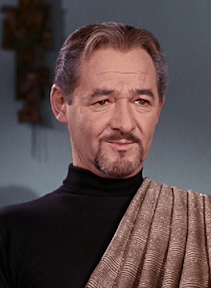 Anon 7, leader of Eminiar VII:
Anon 7, leader of Eminiar VII:he knows better than youSome people think there's an element of betrayal in that question, that we have somehow been betrayed by those in charge of preventing "this" from happening. And I'd agree with that. Those people in charge—and we're talking about authority figures, whether they're accountants, ministers, teachers, government leaders, even the president—they're put in a position of trust. We trust them to do the right thing by us, to protect our interests, to do what is best for the common welfare. We trust that the barber or the beautician is going to treat our hair in such a way that small children aren't going to run screaming when they see us coming. And when they don't—when the accountant embezzles from our retirement plan, when our children come home from school unable to read, what have you—then we feel betrayed by them. We trusted you, we say, and you didn't do what you were supposed to do. Not only do we say it, but in this day and age we say it loudly, and we say it publicly.
But—and there's always a but. . .
Even the most trusted servant isn't given free reign over the household. You check up on him or her, make sure the bank account makes sense, count the silverware once in a while. It's nothing personal, but it's just something you do. You have an obligation to do it. And if that servant takes advantage of you because you didn't keep proper tabs—well, there's a segment of the population, and maybe there's a part of you as well, that's thinking, "You asked for it." Remember the saying, "Fool me once, fie on you. Fool me twice, fie on me."
How did we allow this to happen?
Those trusted authority figures I mentioned—well, they are servants of a sort. They work for us. And therefore, they require some kind of oversight. From us. And if we allow them to run free, if we refuse to follow through on our obligation, then some of that blame falls on us.
That can be an uncomfortable truth. It requires us to look in the mirror, and to study what we see. A lot of people would rather not do that. They'd prefer to pass the buck, to put the blame squarely on those authority figures, to say they're one hundred percent responsible for letting it happen.
After all, How did they let it happen is a much easier question to ask than How did we let it happen.
l l l
There is, though, something more to this story, more than the much-desired happy ending, something that allows us to come full circle to the observation that we started with. Namely, the apparent acquiescence of the people to go willingly, even unquestioningly, to their death—just because the government says so.
How did we allow this to happen?
It can seem like a psychosis, a mass movement taking over supposedly normal people. We've even developed a word to describe them: sheeple, people who are docile, meekly submissive, easily swayed. One day things are like they've always been, and the next day they aren't.
People are told they can't go out in public, and the sheeple go along. People are told they can't visit sick or dying relatives, and the sheeple go along. People are told to take an unproven vaccine, to violate the beliefs of their religion, and the sheelpe go along.
Anyone who asks questions, who dares to disagree—well, they're threatened with having their bank accounts seized, their jobs lost, their children taken away, all for speaking their mind. They're mocked by others, they're beaten by police, they become targets of the last prejudice, Contrary opinions are not allowed, they're told. Resistance is unpatriotic, they're told. They're selfish, they're insurrectionists, they don't deserve to live, they're told.
People are told to go to a disintegrator chamber. And the sheeple go along.
How did we allow this to happen?
l l l
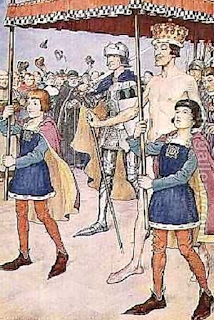 Someone more perceptive than I am compared this to Hans Christian Andersen's fable of the Emperor's New Clothes. You know how that works: the emperor striding through his kingdom in a suit made of material so fine that only the very smart or very competent can see it. None of his subjects wants to be thought a fool, and so they all keep their mouths shut, even though they all know how ridiculous it is, until a child blurts out that this guy's only wearing his skivvies. Well, the Good Book does say that we must have the faith of a child, and that includes the faith to state the truth.
Someone more perceptive than I am compared this to Hans Christian Andersen's fable of the Emperor's New Clothes. You know how that works: the emperor striding through his kingdom in a suit made of material so fine that only the very smart or very competent can see it. None of his subjects wants to be thought a fool, and so they all keep their mouths shut, even though they all know how ridiculous it is, until a child blurts out that this guy's only wearing his skivvies. Well, the Good Book does say that we must have the faith of a child, and that includes the faith to state the truth.Thing is, there's that uncomfortable truth we talked about. And that keeps some people from speaking up about the emperor.
Some people think it's easier to just ignore what's going on, and maybe it won't affect them.
Some people prefer to keep their mouths shut and not get involved, in hopes that it just goes away.
Some people believe the emperor must be right, because he is, after all, the emperor, and he knows best.
And some people like the idea that they're part of the elite, that they possess the intellect required to see the emperor's clothes. They're better than the peasants; they're among the privileged few. They get to tell everyone else what to do.
They're the ones who know how we got to this point, how we allowed this to happen.
And unless there's a Captain Kirk out there, there's no going back. TV
OTHER ENTRIES IN THIS SERIES: 1984 Darkness at Noon Dialogues of the Carmelites The Obsolete Man Murder in the Cathedral Number 12 Looks Just Like You The Children's Story. . . but not just for children Moloch
Published on February 23, 2022 05:00
February 21, 2022
What's on TV? Tuesday, February 27, 1962

 I really enjoy these issues from the first couple of years of the 1960s. The shows are modern in a way that those of the 1950s weren't always, but not quite as mod as those of the late '60s. I like the black-and-white of the dramas, but NBC's colorcast shows are vivid in their brightness. And I like the local Twin Cities characters, so many of whom I would grow up with. Good times. But I'll tell you, that Science program for 7th graders on KTCA must be a hell of a show, the way they keep returning to it.
I really enjoy these issues from the first couple of years of the 1960s. The shows are modern in a way that those of the 1950s weren't always, but not quite as mod as those of the late '60s. I like the black-and-white of the dramas, but NBC's colorcast shows are vivid in their brightness. And I like the local Twin Cities characters, so many of whom I would grow up with. Good times. But I'll tell you, that Science program for 7th graders on KTCA must be a hell of a show, the way they keep returning to it. -2- KTCA (Educ.) MORNING 9:00 SCIENCE—Grade 7 9:35 SCIENCE—Grade 7 10:00 SINGING TOGETHER—Grade 3 10:20 GERMAN—Grade 5 10:35 SCIENCE—Grade 7 11:00 YA HABLAMOS ESPANOL 11:15 PARLONS FRANCAIS—Level I 11:30 UNDERSTANDING ART AFTERNOON 12:00 SCIENCE—Grade 7 1:00 SCIENCE—Grade 7 1:30 YA HABLAMOS ESPANOL 1:45 KOMM, LACH UND LERNE 2:05 SCIENCE—Grade 7 2:30 HEALTH—Grade 3 3:00 FOLKLORE, U.S.A.—Education 3:30 GREEN THUMB—Gardening 4:00 TEACHER’S PREVIEW—Level I 4:15 TEACHER’S PREVIEW—Level II Ch. 2 leaves the air until 6 P.M. EVENING 6:00 DISCUSSION LEADERS 6:30 ASPECTS OF SUPERVISION DEBUT 7:00 LOOKING AT ART—Bryan 7:30 INQUIRY—Discussion 8:00 AREA STUDY—Middle East 8:30 AMERICAN CULTURE—Dr. Alexis 9:00 FOLIO—Arnold Walker 10:00 GREEN THUMB—Gardening 10:30 BACKGROUND—Dr. Ziebarth 10:40 MUSIC FROM OHIO STAGE
-4- WCCO (CBS) MORNING 6:30 COLLEGE OF THE AIR 7:00 ON THE SCENE—Documentary 7:05 FLYING SAUCER—Siegfried 8:00 CAPTAIN KANGAROO—Children Guest: Charlie Gregory 9:00 NEWS—Dean Montgomery 9:10 DR. REUBEN K. YOUNGDAHL 9:20 WHAT’S NEW?—Arle Haeberle 9:30 I LOVE LUCY—Comedy 10:00 VIDEO VILLAGE—Monty Hall 10:30 CLEAR HORIZON—Serial 10:55 NEWS—Harry Reasoner 11:00 LOVE OF LIFE—Serial 11:30 SEARCH FOR TOMORROW—Serial 11:45 GUIDING LIGHT—Serial AFTERNOON 12:00 NEWS—Dave Moore 12:15 SOMETHING SPECIAL—Randy Merriman 12:25 WEATHER—Bud Kraehling 12:30 AS THE WORLD TURNS—Serial 1:00 PASSWORD—Allen Ludden 1:30 HOUSE PARTY—Art Linkletter Guest: Morey Amsterdam 2:00 MILLIONAIRE—Drama 2:30 VERDICT IS YOURS—Drama 2:55 NEWS—Charles Collingwood 3:00 BRIGHTER DAY—Serial 3:15 SECRET STORM—Serial 3:30 EDGE OF NIGHT—Serial 4:00 AROUND THE TOWN—Arle Haeberle 4:30 BOZO THE CLOWN—Children 4:40 AXEL AND DOG—Clellan Card 5:00 QUICK DRAW McGRAW—Cartoons 5:30 CLANCY THE COP—Children 5:55 MR. MAGOO—Cartoon EVENING 6:00 NEWS—Dean Montgomery 6:10 WEATHER—Don O’Brien 6:15 NEWS—Douglas Edwards 6:30 ALVIN—Cartoons 7:00 WINDOW ON MAIN STREET 7:30 CHECKMATE—Mystery 8:30 DICK VAN DYKE—Comedy 9:00 ARMSTRONG CIRCLE THEATER “Assignment: Teen-Aged Junkies” 10:00 NEWS—Dave Moore 10:15 WEATHER—Bud Kraehling 10:20 SPORTS—Hal Scott 10:30 BEST OF GROUCHO—Quiz 11:00 NAVY LOG—Drama 11:30 WEATHER—Don O’Brien 11:35 MOVIE—Melodrama Time approximate. “The Big Bluff” (1955)
-5- KSTP (NBC) MORNING 6:00 CONTINENTAL CLASSROOM COLOR Probability and Statistics: “Introduction to Independent Events” 6:30 CONTINENTAL CLASSROOM COLOR American Government: “Structure of American Courts” 7:00 TODAY—John Chancellor Guest: Carlos Montoya Local news at 7:25 and 8:25 A.M. 9:00 SAY WHEN—Art James 9:30 PLAY YOUR HUNCH—Merv Griffin COLOR 10:00 PRICE IS RIGHT—Bill Cullen COLOR 10:30 CONCENTRATION—Jim Lucas Jim Lucas fills in for Hugh Downs 11:00 YOUR FIRST IMPRESSION—Bill Leyden COLOR 11:30 TRUTH OR CONSEQUENCES 11:55 NEWS—Ray Scherer AFTERNOON 12:00 NEWS—John MacDougall 12:15 WEATHER—Johnny Morris 12:20 TREASURE CHEST COLOR 1:00 JAN MURRAY—Game COLOR 1:25 NEWS—Floyd Kalber 1:30 LORETTA YOUNG—Drama 2:00 YOUNG DR. MALONE—Serial 2:30 OUR FIVE DAUGHTERS—Serial 3:00 MAKE ROOM FOR DADDY 3:30 HERE’S HOLLYWOOD—Interviews Guest: Barrie Chase 3:55 NEWS—Sander Vanocur 4:00 LOVE THAT BOB!—Comedy 4:30 KUKLA AND OLLIE—Burr Tillstrom 4:35 T.N. TATTERS—Children 5:45 NEWS—Huntley, Brinkley EVENING 6:00 NEWS—Bob Ryan 6:15 WEATHER—Johnny Morris 6:25 SPORTS—Dick Nesbitt 6:30 WAGON TRAIN—Western 7:30 JOEY BISHOP—Comedy 8:00 MUSIC HALL GOES WEST SPECIAL COLOR Host: Rex Allen. Guests: Jaye P. Morgan, the Sons of the Pioneers, the Great Ballantine, Vic Shoen and his orchestra “The Perry Como Show” will not be seen. 9:00 BOB NEWHART—Comedy COLOR Guests: The Limeliters 9:30 DAVID BRINKLEY’S JOURNAL COLOR 10:00 10:15 NEWS—John MacDougallWEATHER—Johnny Morris 10:20 SPORTS—Dick Nesbitt 10:30 JACK PAAR—Variety COLOR Guests: Gracie Fields, Stanley Holloway 12:00 NEWS AND SPORTS
-9- KMSP (ABC) MORNING 7:55 CHAPEL OF THE AIR—Religion 8:00 BREAKFAST WITH CAP’N KEN 9:00 JACK LA LANNE—Exercise 9:30 PEOPLE ARE FUNNY—Linkletter 10:00 MY LITTLE MARGIE—Comedy 10:30 SUSIE—Comedy 11:00 TEXAN—Western 11:30 YOURS FOR A SONG—Bert Parks AFTERNOON 12:00 CAMOUFLAGE—Don Morrow 12:30 MAKE A FACE—Bob Clayton 1:00 DAY IN COURT—Drama 1:25 NEWS—Alex Dreier 1:30 MARY JO TIERNEY—Interviews 2:00 JANE WYMAN—Drama 2:30 SEVEN KEYS—Jack Narz 3:00 QUEEN FOR A DAY—Bailey 3:30 WHO DO YOU TRUST?—Carson 4:00 AMERICAN BANDSTAND—Dick Clark Guest: Dale Wright 4:50 AMERICAN NEWSSTAND—Roger Sharp 5:00 MOVIE—Mystery “Accused of Murder” (1957) EVENING 6:15 NEWS—ABC Evening 6:30 HOWARD K. SMITH 7:00 STRAIGHTAWAY—Adventure 7:30 TOP CAT—Cartoon 8:00 HAWAIIAN EYE—Mystery 9:00 NAKED CITY—Police 10:00 10:15 NEWS—Bob AllardWEATHER—Jere Smith 10:20 SPORTS—Tony Parker 10:30 PETER GUNN—Mystery 11:00 ASPHALT JUNGLE—Police 12:00 SAN FRANCISCO BEAT—Police 12:30 CHAPEL OF THE AIR—Religion
11 WTCN (Ind.) MORNING 9:00 CARTOON CIRCUS—Children 9:30 ROMPER ROOM—Miss Betty 10:30 INSTALLATION OF ARCHBISHOP OF ST. PAUL SPECIAL AFTERNOON 12:30 LUNCH WITH CASEY—Children 1:00 MOVIE—Drama “Two of a Kind” (1951) 2:25 MAHALIA JACKSON SINGS 2:30 DR. HUDSON’S JOURNAL 3:00 MEDIC—Drama 3:30 AMOS ‘N’ ANDY—Comedy 4:00 POPEYE AND PETE—Dave Lee 4:45 ROCKY AN DHIS FRIENDS 5:00 SUPERMAN—Adventure 5:30 DICK TRACY—Cartoons 5:50 NEWS—Dick Ford EVENING 6:00 TROUBLESHOOTERS—Adventure 6:30 WHIRLYBIRDS—Adventure 7:00 HIGHWAY PATROL—Police 7:30 MOVIE—Musical “Shall We Dance” (1936) 9:25 MAHALIA JACKSON SINGS 9:30 NEWS—Dick Ford 9:45 WEATHER—Stuart A. Lindman 9:50 SPORTS—Buetel, Horner 10:00 10:30 M SQUAD—PoliceMOVIE—Western “Allegheny Uprising” (1939) “News Roundup” and ‘Mahalia Jackson Sings” will be seen following the movie.
TV
Published on February 21, 2022 05:00
It's About TV!
Insightful commentary on how classic TV shows mirrored and influenced American society, tracing the impact of iconic series on national identity, cultural change, and the challenges we face today.
- Mitchell Hadley's profile
- 5 followers



